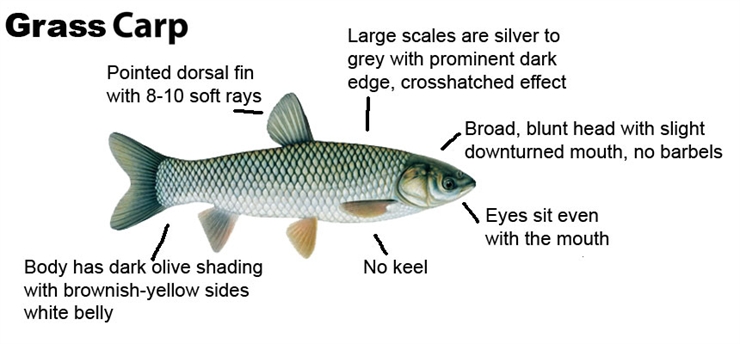Alert! Grass Carp invasion has now spread to Lakes Erie and Huron

Grass Carp description, from Tip of the Mitt Watershed Council. Length can be 5.2 feet, and weight, 80 pounds
It started in two Ohio Rivers and was a wholly avoidable crisis. Now is the time for Ohio and US EPA to stop the ‘research’ projects and urgently start a broad range of eradication methods
Georgian Bay Great Lakes Foundation (GBGLF) issues an alert and calls for Ohio and US EPA to begin Grass Carp eradication measures immediately.
GBGLF Chair, Mary Muter, returned on June 22 from the annual conference of International Association of Great Lakes Researchers (IAGLR) with disturbing news:
The Invasion has started!
Grass Carp is reproducing in two Ohio rivers that flow into Lake Erie, and 10 individuals have now moved upstream into Lake Huron. These fish are very hard to catch because they elude traditional fishing nets. If 10 have been found in Lake Huron, there are likely more present. The largest Grass Carp caught in Lake Erie was 130 cm (51.2 in.), weighed 32.7 kg. (72 lbs.) Their voracious feeding can rapidly wipe out all the plants in a wetland, leaving nothing to nourish or protect native fish species.
A 2017 binational, peer-reviewed risk assessment completed by Fisheries and Oceans Canada and the U.S. Geological Survey determined that a Grass Carp invasion into Lake Huron would likely occur within 10 years but stated: “If the rate of arrival increases, the onset and magnitude of risk will increase.”
Only one year later, they are in Lake Huron in unknown numbers!
In 2015 a researcher found 8 eggs in the Sandusky River. In 2017 Ohio found there were 7,800 eggs.
There is now only a narrow window of opportunity for eradication.
At the IAGLR conference it was clearly stated: “It will take fewer Grass Carp [than the other three types of invasive Asian Carp] to have a substantial impact on Great Lakes ecology”.
However, Ohio’s plan is to continue to catch these very large fish, insert tracking devices, release them live, and then study their movements in order to devise possible “management techniques” to “control” the population rather than eradicate it.
With both Ohio and Michigan not planning to eradicate the Grass Carp, this wetlands destroyer is on the verge of becoming established in the Great Lakes.
To stop this invasion, it is urgent to implement every possible eradication method now!
Dr. Nicholas Mandrak, Associate Professor at the University of Toronto, recently stated: “These tagging operations confirm what we already suspected, and do not change the basic need to eradicate these harmful invasive fish. They have an obligation to the entire Great Lakes community to begin effective eradication immediately.”
Canada is spending up to $20 Million over five years to prevent Grass Carp from establishing in the Canadian Great Lakes waters. It is unacceptable that American agencies are putting the future of our Great Lakes ecosystems at risk by conducting “research projects” in areas already invaded by Grass Carp. They have an obligation to begin immediately a broad range of eradication methods.
Lake Erie commercial fishers are being paid $75 for each Grass Carp that they catch in their nets and last year turned in 116 to the Ohio Department of Natural Resources. The Grass Carp that they catch in their deep, open-water nets are “by-catch”, for these fish seldom frequent deeper waters. There must be much higher numbers along the shorelines, where there are wetlands. Commercial fishers know well that Grass Carp will ultimately destroy the essential wetland spawning and nursery habitats for the native fish they are catching and selling – walleye/pickerel and whitefish.
Tim Purdy, a Canadian Lake Huron commercial fishing operator, caught a metre-long Grass Carp last week in Lake Huron about a mile north of the Bluewater Bridge. A couple of years ago, Tim made a presentation to a Standing Committee in Ottawa indicating that his family’s fishery company has been operating since 1900 and he was hoping to be able to pass it on to his children. He expressed his concern that, if these Grass Carp get established, there will be nothing to pass on.
Compelling research by Professor Pat Chow-Fraser of McMaster University has already pointed out that Georgian Bay contains the highest quality, most diverse and extensive wetlands found anywhere in the Great Lakes. “We don’t want our wetlands destroyed by these very large invasive fish. Our native fish and other species that need wetlands for spawning, nursery and feeding habitat will be decimated”, said Mary Muter, Chair of Georgian Bay Great Lakes Foundation.
An assessment carried out in 2017 found up to 1.2 million acres of wetlands including submerged aquatic plants in the five Great Lakes. Each acre of wetland provides $1,500 annually in ecological services. If all the Great Lakes are invaded by Grass Carp, the cost of the loss of these ecological services could mount to $16.5 Billion per year. Can we afford to let this happen?
What can be done?
We are asking Ohio and Michigan to rethink their study/management strategies and instead implement eradication methods immediately to target and remove all Grass Carp possible, and to employ barriers to prevent successful spawning and egg hatching.
Georgian Bay Great Lakes Foundation
Known for sound scientific research and solutions supporting water levels, water quality, wetlands, the fishery and aquatic invasive species control.
Media
Georgian Bay in danger of grass carp invasion, wetland destruction
For more information:
http://www.dfo-mpo.gc.ca/csas-sccs/Publications/ResDocs-DocRech/2016/2016_117-eng.html
http://www.dfo-mpo.gc.ca/csas-sccs/Publications/ResDocs-DocRech/2016/2016_118-eng.html
http://www.dfo-mpo.gc.ca/csas-sccs/Publications/Pro-Cr/2016/2016_052-eng.html
http://www.dfo-mpo.gc.ca/csas-sccs/Publications/ResDocs-DocRech/2016/2016_101-eng.html
http://www.dfo-mpo.gc.ca/csas-sccs/Publications/ResDocs-DocRech/2016/2016_114-eng.html
http://www.dfo-mpo.gc.ca/csas-sccs/Publications/SAR-AS/2016/2016_057-eng.html
AWARE Simcoe note: Tim Purdy speaking to parliamentarians six years ago
https://openparliament.ca/committees/fisheries/41-1/36/tim-purdy-1/only/









Leave a Reply